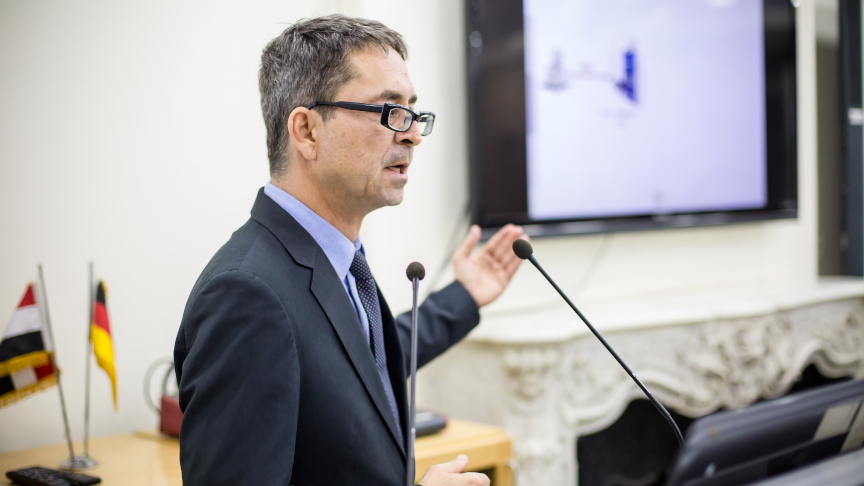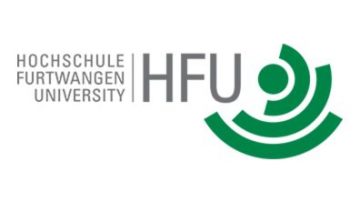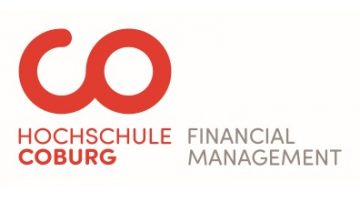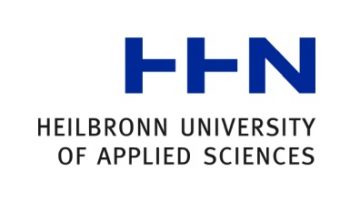Public Lecture on Innovation Culture

Together with researchers from Egyptian universities, young entrepreneurs and an interested audience from private sector corporations, he discussed how to create a fertile ground for innovative and successful organisations through examples for innovation culture and best practices of businesses in Germany. The event was organised by COSIMENA (Clusters of Scientific Innovation in the Middle East and North Africa) in collaboration with the liaison office of Philipps-Universität Marburg in Cairo.
The evening was opened by Ms. Isabell Mering, Director of the DAAD Regional Office Cairo, who had just taken over her duties as of 1 October 2018. She approached the topic stating that innovation is the epitome of sustainability and economic growth and functions as an umbrella body for a wide range of topics. Moreover, she underlined Egypt’s potential as a perfect “fertile ground” for further investment in the region and hence emphasised the importance of COSIMENA formats to provide platforms to exchange views and discover the potential of cross-cultural cooperation.
Prof. Dr. Michael Stephan, Chair of Technology and Innovation Management and Head of the Research Centre for Strategy, Innovation and Competition at Philipps-Universität Marburg, then took the floor. In his initial statement he stressed that innovation culture is currently one of the hottest topics in management and has become a major driver of the success of businesses. With increased competition and shortening product and technology life cycles, businesses invest more and more money in research and development to bring new or improved products and services to the market. While innovation has long been a topic only relevant for people working in research and development departments, Stephan pointed out that nowadays, as corporate strategies focus more and more on innovation leadership, the whole corporation is challenged to become innovative.
Instead of giving a definition of innovation or innovation culture first, Stephan asked why innovation is a challenge in terms of corporate strategies. He opined that innovativeness is the outcome of the appropriate balance between efficiency on the one side and its opposite, creativity, on the other side. The challenge of innovativeness thus turns rather into an organisational challenge concerning human resource management and the creation of a fertile ground for innovation. Stephan then went on stating that the big multinational companies usually associated with innovation, like Google or Apple, are less suitable as a reference for Germany or Egypt because they have much more resources than typical companies. Therefore, he instead chose an inductive approach and portrayed four best practice cases of German businesses which have all been working on their innovation performance on different levels.
For example, the well-known and well-established chemical company Beiersdorf invests in their employees by offering a yearly one-week expedition to diverse organisations in the city of Hamburg. There’s no specific task for the employees to fulfil but to shadow the organisations’ work and ongoing projects in order to foster their ability to think outside the box. Stephan’s next example was Festo, a multinational medium-sized business operating in industrial control and automation, democratised its future development programme by including all its employees in the process of the enhancement of innovation. Every single employee has the chance to become the mentor of their own future project where they oversee all relevant aspects including finances. According to Stephan this approach is particularly effective when it comes to accepting new changes in the working environment. During the lecture, 3M, a multinational conglomerate corporation operating in several fields especially stationary, served as a prime example for innovation: branches of 3M in Germany encourage their employees’ creativity and attempts to develop new ideas for projects through the introduction of a “failure culture“ meaning that failures are not viewed as regrettable mistakes of individuals but rather as a chance for further development. This aims at the minimisation of the sunk-cost bias and therefore includes, for example, the celebration of “project funerals”. In his last example the speaker referred to the small utility service provider Stadtwerke Gießen which invests in start-ups and established a start-up hub. It offers an open-plan office for founders in the energy sector where they can develop and implement their ideas. Stadtwerke Gießen thereby hopes to foster development and practical solutions regarding the energy revolution and especially digitalisation from which it may also benefit eventually.
Based on the examples above, Stephan then introduced seven dimensions of innovation. According to him, innovation culture must be part of a company’s strategy, needs to be bound to the management, should include failure culture and give employees the opportunity to develop – especially through HR. It also requires collaboration, the freedom to be innovative and knowledge management. At that point he referred to the beginning of his lecture stating that there is no overall definition or model of innovation culture; the concept rather needs to be adapted to the special needs of a specific context.
Stephan then moved on to offer starting points for the current development in corporate culture in Egypt, especially regarding the growing start-up scene. He encouraged the audience to participate in the discussion and think about possible links of the examples presented to German culture and their applicability to Egypt. In this context the potential of different innovation strategies for Egyptian corporations were discussed with a focus on the current start-up scene. An important question raised by the audience was about the availability of tools to measure the degree of innovation. According to Stephan it is difficult to measure innovation since it is more the result of a holistic process involving the entire company. However, he pointed out that further research regarding this issue is already in progress. The evening was rounded off with a networking dinner providing opportunities for further elaborate discussions between the participants and Prof. Stephan.





